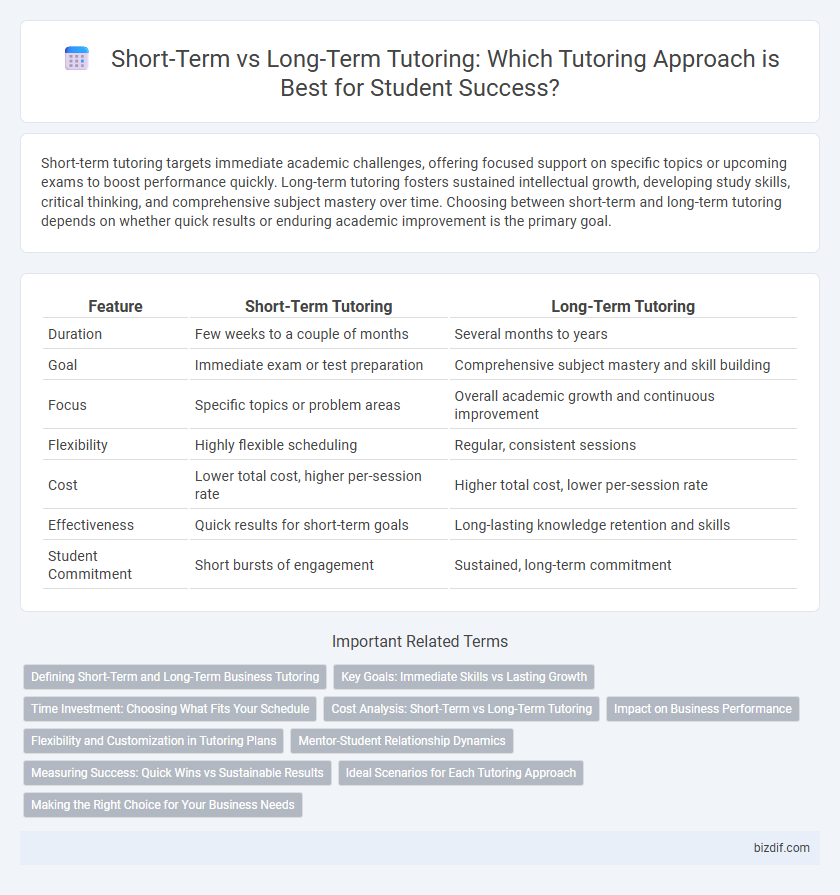Short-term tutoring targets immediate academic challenges, offering focused support on specific topics or upcoming exams to boost performance quickly. Long-term tutoring fosters sustained intellectual growth, developing study skills, critical thinking, and comprehensive subject mastery over time. Choosing between short-term and long-term tutoring depends on whether quick results or enduring academic improvement is the primary goal.
Table of Comparison
| Feature | Short-Term Tutoring | Long-Term Tutoring |
|---|---|---|
| Duration | Few weeks to a couple of months | Several months to years |
| Goal | Immediate exam or test preparation | Comprehensive subject mastery and skill building |
| Focus | Specific topics or problem areas | Overall academic growth and continuous improvement |
| Flexibility | Highly flexible scheduling | Regular, consistent sessions |
| Cost | Lower total cost, higher per-session rate | Higher total cost, lower per-session rate |
| Effectiveness | Quick results for short-term goals | Long-lasting knowledge retention and skills |
| Student Commitment | Short bursts of engagement | Sustained, long-term commitment |
Defining Short-Term and Long-Term Business Tutoring
Short-term tutoring focuses on addressing immediate learning goals or specific skill gaps within a limited timeframe, often spanning a few weeks to months. Long-term tutoring involves ongoing educational support that extends over several months to years, fostering continuous academic growth and in-depth subject mastery. Businesses seeking to enhance employee skills choose short-term tutoring for targeted training, while long-term tutoring supports sustained professional development and career advancement.
Key Goals: Immediate Skills vs Lasting Growth
Short-term tutoring targets immediate skill acquisition and quick problem-solving for specific subjects or upcoming exams, ensuring rapid improvement in critical areas. Long-term tutoring emphasizes sustained academic growth, fostering deeper understanding, study habits, and conceptual mastery over time. Prioritizing immediate goals versus enduring development helps tailor the tutoring approach to individual student needs and learning objectives.
Time Investment: Choosing What Fits Your Schedule
Short-term tutoring offers flexible sessions designed to address immediate academic challenges, making it ideal for students with limited availability or urgent needs. Long-term tutoring involves consistent, scheduled meetings that foster sustained skill development and deeper understanding over time. Evaluating your available hours and learning goals helps determine whether concentrated bursts or ongoing support best fits your schedule and academic objectives.
Cost Analysis: Short-Term vs Long-Term Tutoring
Short-term tutoring often involves higher hourly rates but lower overall costs due to limited session commitments, making it suitable for immediate exam preparation or specific skill improvement. Long-term tutoring usually offers discounted rates per session, resulting in cost savings over time and supporting sustained academic progress and deeper understanding. Evaluating the total investment against learning goals is essential for optimizing tutoring expenses effectively.
Impact on Business Performance
Short-term tutoring provides immediate skill enhancement and quick problem-solving strategies, delivering fast results for businesses seeking rapid employee development. Long-term tutoring fosters sustained knowledge retention and continuous skill improvement, leading to more profound and lasting impacts on overall business performance. Companies investing in long-term tutoring often experience higher employee productivity, better adaptability, and increased innovation over time.
Flexibility and Customization in Tutoring Plans
Short-term tutoring offers high flexibility, allowing students to address specific weaknesses or prepare for exams with tailored sessions that quickly adapt to immediate needs. Long-term tutoring provides a more comprehensive customization, enabling tutors to develop personalized learning plans that evolve with the student's progress and academic goals. Both approaches optimize learning efficiency, but long-term tutoring ensures sustained growth through continuous adjustments and in-depth subject mastery.
Mentor-Student Relationship Dynamics
Short-term tutoring often centers on immediate academic goals, fostering a task-oriented mentor-student relationship with limited emotional bonding. In contrast, long-term tutoring cultivates deeper trust and personalized guidance, enabling mentors to adapt teaching methods to evolving student needs. This sustained interaction significantly enhances motivation, confidence, and academic growth over time.
Measuring Success: Quick Wins vs Sustainable Results
Short-term tutoring often emphasizes quick wins by targeting specific test preparation or immediate skill gaps, delivering rapid improvement in grades or performance. Long-term tutoring focuses on sustainable results through continuous skill development, fostering deeper understanding and critical thinking abilities over time. Measuring success in tutoring requires balancing immediate progress with the lasting retention and application of knowledge.
Ideal Scenarios for Each Tutoring Approach
Short-term tutoring is ideal for students needing focused, immediate help on specific subjects or upcoming exams, offering intensive support that targets urgent learning gaps. Long-term tutoring benefits learners aiming for sustained academic improvement, skill development, and consistent progress over weeks or months, fostering deeper understanding and retention. Choosing between short-term and long-term tutoring depends on the student's goals, timeline, and the nature of the challenges faced in their educational journey.
Making the Right Choice for Your Business Needs
Short-term tutoring offers immediate, targeted support ideal for addressing specific academic challenges or exam preparation, making it a strategic choice for businesses seeking quick results. Long-term tutoring fosters sustained improvement and skill development, benefiting companies aiming to enhance overall learner performance and retention over time. Evaluating your business goals, budget, and desired outcomes ensures the right tutoring approach aligns with your educational needs and growth objectives.
Short-Term Tutoring vs Long-Term Tutoring Infographic

 bizdif.com
bizdif.com